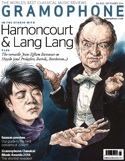Texte paru dans: / Appeared in:
*

GRAMOPHONE (09/2014)
Pour s'abonner /
Subscription information
DHM 88843051022

Code-barres / Barcode : 0888430510227
Consultez toutes les évaluations recensées pour ce cd
~~~~ Reach all the evaluations located for this CD
Reviewer:
David
Vickers
By his own admission, the Polish composer Krzysztof Penderecki has ‘spent decades searching for and discovering new sounds’. Nowhere are the breadth and variety of The Neapolitan composer Davide Perez (1711-78) settled in Lisbon and his mastery earned him respect in London: he became an honorary member of the Academy of Ancient Music in 1774, in which year Robert Bremner published a lavish edition of Mattutino de’ morti. The only full-scale work printed during Perez’s lifetime, it was first performed for the Portuguese royal family’s pilgrimage to the Sanctuary of Nossa Senhora at Cabo Espichel in 1770 but soon thereafter was adopted by the Confraternity of St Cecilia for its annual commemorations of deceased musicians until long into the 19th century.
The musical forces of Pavia’s historic Ghislieri college give accomplished performances of all three nocturnes that feature punctuating horns, alert strings, disciplined choral singing, eloquent solo voice passages, operatic quartets and telling use of woodwinds for special illustrative effect (such as prominent bassoons at the beginning of the third nocturne). The first nocturne has an outstanding moment of unaccompanied choral counterpoint to gently illuminate the sentence ‘For that I have sinned too much in my life’. The second nocturne shows the engaging imagination of the composer and the qualities of his modern-day interpreters: Salvo Vitale’s enthralling lowest notes illustrate the depths of despair in ‘De profundis clamavi’ and Roberta Invernizzi’s hushed singing is captivatingly penitent in ‘Dirige Domine Deus’. Dropping string figures and solo voices deployed for the passage ‘et lux perpetua’ towards the end of the second nocturne remind us that Perez was a close contemporary of Pergolesi but the flowing textures and contrasting moods reveal him as an original master whose music deserves a fuller restoration.
Cliquez l'un ou l'autre
bouton pour découvrir bien d'autres critiques de CD
Click either button for many other reviews


